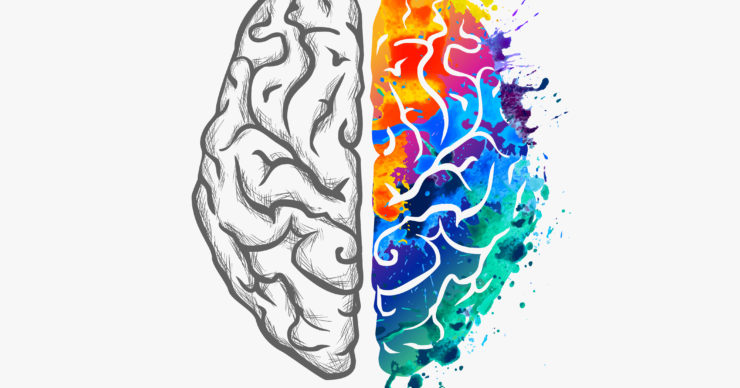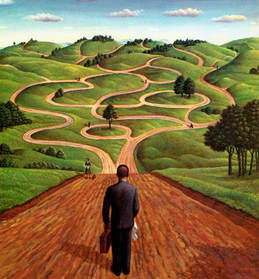|
We’re all social creatures. Social animals. So much so that you could say our very survival depends on our ability to interact well with others. As an infant we needed to be able to communicate to our parents, through crying, when there was something bothering us and needed some alleviation. Even later in life, if a person senses a serious ailment in themselves but is unable to communicate this to a professional, then this could lead to some serious complications later on.
We rely on our social interactions with family and close friends to give us a sense of belonging, which is very important for our mental health and self-worth. Networking often plays an integral role in opening doors for career opportunities. You often hear the term “self-made man" or "self-made millionaire” thrown around, or perhaps you came across an entrepreneur proudly proclaiming that their success was due solely to their hard work alone. But anyone who proclaims this is, quite frankly, deluding themselves. This is because no one got to where they are today by living in a complete vacuum. It’s true that their hard work may have been the main contributing factor for their eventual success, and that is to be fully commended. But who instilled in them that work ethic? Who approved them for that bank loan or grant? Who provided this person with encouragement and sense of belonging during the tough times, which in turn laid down the secure foundation for them to work harder and longer? Who inspired this person to become a successful entrepreneur in the first place? Yes, this person still needed to work damn hard to become a success. But it also shouldn’t be denied that this person enjoyed some good fortune along the way too in the guise of having others around them that provided the right cocktail to help this person realise their goal. What all this essentially illustrates is that your fate in life is tied in with the people you choose to associate with. You’re generally either associating with people of good quality and good character, or with people of negative quality and character. The people you are investing your time with will most likely be the difference between you being happy or unhappy in life. Not to mention the difference between enjoying great successes or enduring painful failures in life. So become aware of the people you are associating with, and be selective too. That’s the message I want to get across with this article: Never underestimate the importance and power of your social relations.
0 Comments
Have you heard about the centuries old rope technique that elephant trainers will use to control their elephants? The trainer takes a baby elephant and ties one of its legs to a post. The young elephant will then naturally try to escape. It will struggle for days, pulling at the rope with all its might to try and break free. Eventually the young elephant will realise that this rope is too great an opponent and so will simply stop trying. It concludes that the length of this rope is essentially the full range of its motion and freedom, and that there is nothing further that can be done.
Then later, when the elephant is fully grown and at full strength, it won’t even try to escape even though it would now have the strength to easily break free. This is because the now fully grown elephant doesn’t believe it has the capability to break free. As such, it won’t even bother trying. In the field of psychology this is referred to as learned helplessness. Basically, the elephant was taught early on that the struggle against the rope was useless, and so is now convinced that this same obstacle that defeated it years ago can still defeat it today. While human infants are helpless in numerous ways, they also get to show off their great resilient nature as they begin to transition into toddlers: They crawl, they stand up, learn to walk, fall down, pick themselves back up and learn to walk better. They are determined. But unfortunately for many people this resilient nature gets undone and a learned helplessness, acquired through certain life experiences, begins to form. With that acknowledged, it’s important that we make the time to pay close attention to what is going on inside our heads. So do that now – pay close attention. What is the running commentary that is being spoken inside your head? Are there any proverbial ropes from the past that you are still allowing to keep you bound? While helplessness can be learned, it can also be unlearned. Remember that. Is it time for you to start unlearning something? What makes people differ from one another? Since the dawn of time people have simply been different from each other – they have thought differently, acted differently, and they fared differently in life from each other. So why do people differ? Whether coming from the scientific circles, philosophical or moral circles, or from wherever else, it's a question that’s been raised and pondered down through the centuries.
Some asserted that there is a strong physical/genetic basis that make these observable differences in people both unavoidable and unalterable. Others, however, pointed towards strong differences in people’s backgrounds, upbringing, and how they were ultimately taught and trained in their younger, more formative years as the reason why people differ from one another. So who is right? Today most experts agree that it’s not strictly one or the other, that is to say; it’s not about it being either genes or environment, being either nature or nurture, as to the reason why people differ. Rather, there is a give and take between both sides, which begins from conception and continues on throughout the various stages of one’s life. Neuroscientist Gilbert Gottlieb once said: ‘not only do genes and environment cooperate as we develop, but genes require input from the environment to work properly’ It’s certainly true that every person is born with their own unique genetic endowment. This means that people may start life with different temperaments, different aptitudes and so on. However, it is also evide clear that experience, training, and a person's own personal effort will take them the rest of the way. As psychologist and psychometrician Robert Sternberg once wrote regarding the major factor in whether people achieve expertise in something or not: 'it is not some fixed prior ability, but purposeful engagement' Or as Alfred Binet, the inventor of the IQ test, put it: 'It’s not always the people who start out the smartest who end up the smartest' So what does all this mean for you, as an individual? It means that your abilities, your traits, the way you think and the way you habitually act is not set in stone. Sure your genetics have played a part and will continue to play a part. But at the same time you are malleable. Through concerted effort you can change aspects about yourself you might not be satisfied with. But you need to have the belief first that it is possible for you to change. You see, if you believe that your qualities are carved in stone – as many people do – then this is unlikely going to serve you. Those who believe that their qualities and traits are set in stone, and therefore predestined to experience life in a certain way because of these unmalleable traits are said to have what is referred to as the fixed mindset. Having such a mindset tends to also create a sense of urgency in a person to prove themself over and over again to others. Why is this? Well if you believe that you only have a certain (fixed) amount of intelligence, or are stuck having a certain personality for the rest of your life, then you’d likely want to prove to others that what you do have is a healthy measure of intelligence, or that your personality is one that others can appreciate and warm to. But there is another mindset. In this mindset your traits are not viewed as merely a hand you’ve been dealt at birth and so must live with; a hand that has you constantly trying to convince yourself and others that you have a royal flush, to use poker lingo, when deep down you are worried it’s only a pair of tens you’re holding. On the contrary: This other mindset is based on the belief that your basic qualities are things you can cultivate through your efforts. This is the growth mindset and the basic premise of this mindset could be summarised as the following: Although people may differ in just about every way – from their individual talents, interests, aptitudes and temperaments – everyone can develop, grow and change (for the better) through simple effort, application, and experience. So does a person with a growth mindset believe that anyone can become anything; that anyone with good motivation or the right education can become an Einstein, da Vinci, or a Beethoven? No, this is not what having such a mindset entails. Having a growth mindset is about believing that a person’s true potential is unknown (and also unknowable), so it’s impossible to foresee what can be accomplished and achieved with years of passion, effort and training. You can clearly see here how having the belief that prized qualities can be developed (the growth mindset) creates a passion for further learning and continuous personal development. After all, why waste time trying to prove to others how great you are when you could be getting better? Why try hide deficiencies instead of overcoming them? And why seek out the predictable, tried and tested, instead of those experiences that will truly test you and help you grow? This desire for stretching yourself, even when things aren’t going well, is a hallmark of having a growth mindset. Your inner strength. Your ability to bounce back quickly. Your resolve. These are some definitions that come to mind when thinking of “resilience”. So why is resilience particularly important to develop? Well, simply put: A good dose of resilience will not only help you overcome challenging moments in your life, but it will also help turn these adversities into advantages. This is achieved through the specific mind-set and focus that resilient people tend to adopt.
While each of us have some level of resilience, some people, it seems, have more than others. In other words; some people are simply more resilient than other people. However, what's important to keep in mind is that no matter what your level of resilience is, you have the ability to learn and become more resilient. With this article I will explore some of the traits and characteristics that unite resilient individuals according to research. A leading psychologist, Susan Kobasa, maintained that there are three elements that are essential to resilience: Challenge – When it comes to experiencing difficult moments, resilient people view such moments as a “challenge” rather than as a “paralyzing event”. Furthermore and even more crucially, they view their own failures and mistakes as lessons to be learned from and as opportunities for growth, rather than viewing such mistakes as a negative reflection on their own abilities or self-worth. Commitment – This is a predominant feature of resilient people – commitment: Resilient people tend to be not only committed to their goals, but they commit to their friendships, relationships, causes that they care about, their religious and spiritual beliefs and so on. In other words, they are committed to their lives as a whole, and this gives them a compelling reason to get out of bed in the morning. Personal Control – Resilient people use their time and energy focusing on things and events that they have control over. Through this tendency of putting in their best efforts where they can have the most impact, they feel empowered and confident. This is what is referred to in psychology as having an “internal locus of control” By way of contrast; those who spend their time worrying about uncontrollable events can often feel lost, helpless, and powerless to take action. This way of being is referred to as having an “external locus of control”. Several further characteristics that appear common in resilient people were identified by Dr Crow, who is the Programme Director of the Centre for Learning Connections. Some of these included:
We will face adversity in life. This is a given. It stands to reason then that how we view these adversities will strongly affect how and how often we will succeed. This is why it is of utmost importance to cultivate a resilient mind-set. By doing so we can enjoy the fruits that having such a mind-set will ultimately bear. When we face the prospect of doing something that is ambitious, challenging, or unfamiliar, our mind will naturally conjure up thoughts about it. Such thoughts may appear as simple words or sentences. At other times these thoughts may manifest as images or memories. This happens without our conscious control and all of this is, of course, perfectly normal, as this is what minds do. Thoughts will come, stay for a bit, and then leave – whether we “like” these thoughts or not.
For the most part we tend to listen to our thoughts, and believe them. And by listening to and believing our thoughts, we tend to act or behave in accordance with them. In a clinical setting, this phenomenon is often referred to as “thought-action fusion”. Whether for good or for bad, fusing with our thoughts is a fundamental part of our everyday lives. It allows us to make sense of the world, allows us to problem-solve, sustain relationships, and work towards our goals. However – and this is the crucial point to bear in mind – when we fuse with thoughts that are influenced by stress, fear, and emotional pain (from the past or from the present), then this can be a serious hindrance to our own personal development. It can negatively affect our self-esteem and stop us from pursuing our goals and ambitions. When we want to engage in certain activities that carry a perceived risk-reward element, one should be mindful of certain ‘thinking styles’ that may emerge. We obviously want to engage in a thinking-style that serves us, and not one that holds us back. Some of the more common and automatic negative thinking styles that can get activated when we want or need to engage in certain activities include:
I would like to invite you to take a few moments, either now or at another time that suits, and reflect upon the following question: Up until this point in time, how have your automatic thoughts, and the fusing associated with them, affected your ability to build the type of life and life-style you want to have? Remember – it’s the fact that we fuse with our automatic thoughts and sometimes get lost in their stories that impedes us – it’s not the thoughts themselves. These thoughts are just a normal part of being human, and we can learn to change our relationship with them. Receiving coaching from a competent and skilled life coach often changes people in profound and uplifting ways; reshaping their perspective on many things, including what is possible, and how it’s possible. It equips the client with the necessary tools, strategy, vision, and self-confidence, to obtain the life they seek to create.
Simply by having a coach in one’s life and chatting with him or her on a regular basis can produce immense value and results. You don’t even have to work particularly hard either to notice the great benefits that coaching brings forthwith, because the synergy that occurs as a result of the coach-client relationship is what makes the biggest difference to any well-motivated client. That being said, however, there are certain ways for the client to maximise the value received from coaching even further. Below are 3 such ways for you to get even more value from your coaching sessions. 1. Talk about what is happening for you in that moment Always remember that in a session you can focus on whatever you want. Sometimes, as coaching proceeds onwards, a client may feel somewhat compelled to focus only on certain things relating to their original goals and vision, because they feel this is the best way to get the most out of a session. Consequently, they may feel talking about other things, such as their needs, a problem they may be facing, or an aspect about themselves that they’ve newly discovered and want to improve, will not be so useful to bring up. I would disagree here. While it is most certainly important to remain consistent in things, this should not be interpreted as having to focus rigidly on an agreed upon task or strategy, while disregarding what else might be happening outside the coaching session, and/or inside yourself. Goals can, and often do, change. And quite often for the better. But it is important that you are open and honest with yourself, and with your coach during a session. Feel free to bring up what is happening for you in the here and now. And if a detour then manifests in your original plan as a result, then enjoy the detour J 2. Focus on how you feel and want to feel, and not just on the results you want to produce Oftentimes during coaching sessions, clients feel a need to focus the time on how to produce more tangible results, be that financially related, work related, and so on. This is, of course, highly relevant. However, one should not forget the intangibles either, such as feeling genuinely happier, more satisfied, more at peace, and more inspired. (Tangible) Results are important, very important, but the feelings you experience during your day are equally important. It can be easy to get wrapped up in our thoughts as we calculate probable outcomes, contemplate possible strategies, and fantasise on potential outcomes. That’s all well and good, but it’s all head stuff. And you are more than your mind – you are your body too. So try aim for a balance. Try not always be in your head. Come into your body too. Enjoy the feelings. Let these feelings excite and inspire you. Remember: Seeing tangible results is a great thing, but being in tune with your feelings is also a great thing. So make a conscious effort to enjoy both. 3. “Being coached” doesn’t just happen during sessions A typical coaching session tends to last for approximately 60 minutes, however, there are more than 10, 000 minutes in a 7-day week. Coaching is a very powerful tool. What you discuss with your coach during sessions will tend to resonate with you during the week. The ideas that have been discussed will start to seed and grow between sessions. To accelerate this process all you need to do is consciously take stock in your mind of anything that was discussed during a session, which struck a deep chord within you; something that can be applied in that moment, whether that’s a newly equipped skill or a shift in perspective. Be open to the positive change. Consciously embrace the positive change. You can do this “conscious stock taking” anytime. Do it between sessions and watch the seeds grow and bear fruit. Pleasure over pain or pain over pleasure? You decide. To be clear, this is in the context of either taking action on something, or putting it off. We know taking action will be inherently good for us, yet also we’ll often associate taking action as something that is not particularly fun or pleasurable. The alternative? Put it off! Relax…unwind instead. Surely that’s more of an appealing option? After all, are we not all pleasure-seeking beings?
Sometimes, when we choose pleasure over pain the long-term ramifications might not appear all that significant to us. We’ll minimise these long-term ramifications by bargaining with ourselves, promising that we’ll simply “get serious tomorrow” but as for today “it’s no big deal if I just unwind a bit, see my friends, watch that movie etc.” Or we may try convince ourselves of a story like “I’m too tired and stressed to get anything done now anyway”. Usually the stories we tell ourselves are totally untrue. But the lure of pleasure in the present moment is extremely powerful. So how can we delay this gratification, in order to get more serious in the present moment? Two ways: Changing your perspective and changing your perception. Simple as that. With perspective, you should try to keep the long-term perspective in mind. What is the likely long-term outcome going to be of continuing on with this pattern of simply putting off worthy tasks and seeking immediate gratification instead? How is your future going to be impacted by continuing on in this manner? While on the flip-side; how is your long-term future going to be positively affected by taking the reins now and pro-actively doing what is necessary? Forming those healthy habits. Living that healthy lifestyle. Surely this is the way to ensure your true future happiness, as well as true future pleasure? This leads us onto perception… Instead of perceiving taking action in the present moment as something painful, and perceiving putting it off as something more pleasurable, this needs to be reversed. Taking action now is, in fact, what will lead us to this pleasure we are seeking, while putting things off is likely what will continue leading us to the pain we are trying to avoid. You can create a life of abundance and deep satisfaction for yourself, or you can create a life of mediocracy; a life of simply getting by. It is your responsibility for the type of life you create for yourself. It comes down to the decisions you make in the here and now. And those decisions will be influenced and swayed by the perceptions and perspectives you hold. The Journey. The Path. Whatever you want to call it; it is something that we are all on together, yet something that we are also on alone. Therefore, we need to rely on ourselves, trust ourselves, and be patient with ourselves, as we proceed ever forward with our lives. Ever forward with our dreams and our hopes. No one can do this path for us. Everyone is on their own. Yet it doesn’t have to be lonely either. It can be filled with great company and support – if you are honestly open to receiving. Such is the paradox of life itself: It is one thing, while something else, something contradicting, at the same time.
Realise that this journey of yours will be challenging, to say the very least. It will likely be excruciatingly painful at times. Testing you to your very core. It may make you question your worth, your values, and even your sanity on occasion. There will always be options during such moments. These are the moments when your path is veering in two, three, or more directions, and you must decide which of these directions you will take. You will often know instinctively in advance, which of these directions is the smoother, yet more barren one, and which is the rockier, steeper one, yet the one that ultimately yields more fruit. You decide which one to take. Realise too, that you have the qualities and fortitude to successfully navigate any path, even the steepest and rockiest of ones. You mightn’t always see or feel these qualities in yourself, but at least someone else will. However, it is not about what someone else sees in you – it’s what you see in yourself that matters. During these trying times it can be easy to feel very alone, and even helpless. After all, we are on our own paths alone here. This is true. But we are also never alone. Reach out. Open up. Believe in yourself. Connect with others, who are also on their journeys. Connect with professionals if need be. But most importantly – be connected with yourself. Through honest connection with yourself will come patience and kindness towards yourself. And this, my friend, will be one of the greatest gifts you can give yourself on this journey. |
AuthorShayne Hartung Archives
January 2024
|








 RSS Feed
RSS Feed